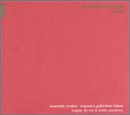| All Artists: Nunes, De Roo, Pomarico, Ensemble Modern Title: Quodlibet Members Wishing: 2 Total Copies: 0 Label: Disques Montaigne Release Date: 9/11/2001 Album Type: Import, Original recording reissued Genre: Classical Styles: Chamber Music, Historical Periods, Classical (c.1770-1830) Number of Discs: 1 SwapaCD Credits: 1 UPC: 713746245221 |
Search - Nunes, De Roo, Pomarico :: Quodlibet
CD Details |
CD ReviewsA literal topography of memory greg taylor | Portland, Oregon United States | 11/30/2007 (4 out of 5 stars) "It sometimes seems as if contemporary classical music is being written by mad scientists. There is all this energy devoted to hearing what would happen it we use this tuning or that note cluster and so on. Not that I am against such experiments when they work as music. And I know that that is a personal reaction. What is the aesthetic bedrock on which we judge the musicality of Xennakis, Braxton, Feldman, Dusapin or Nunes?
Having delivered that caveat, I must say that I love this piece. The excellent notes by Paul Griffith tells us that this piece was designed for a performance in Coliseu de Recreios in Lisbon where it received its first performance on May 11th, 1991. Nunes had, from his childhood gone to many performances or events in the Coliseu. As such it is the site of many memories. Nunes takes advantage of this with a musical metaphor. Quodlibet is composed of many quotes from all of Nunes' previous works or uses compositional strategies that were employed in the earlier pieces. The continuity of the piece is further fragmented by the use of three seperate musical groupings: an orchestra of 45 players along with seven soloists (the orchestra gubenkian), an instrumental ensemble of 21 players (the ensemble modern)and a percussion sextet. Complicating the score is the presence of two conductors: Emilio Pomarico for the orchestra and Kasper de Roo for the ensemble). During the performance at the Coliseu, musicians were placed throughout the stadium and move around giving the performance a sense of changing space. Like I said, it all depends on how well it all comes together for the listener. I have several disadvantages as a listener. I am listening to the CD and not the performance so I don't have the sense of a shifting aural space. I am not familiar with Nunes' music so I cannot really appreciate the use of the quotes. And yet I like this piece very much. There is a sense of spacing in the recording and in the arrangement of the music. The musical materials all have what I guess you could call a family resemblance. Nunes has managed to put all this together with little sense of collage. There are no unifying themes except the consciousness of one individual. It is a little like the musical equivalent of Julio Cortazar's Hopscotch. If you are adventurous (and since you are looking at this listing, the chances are that you are a little musically weird) then give this work a listen. It is an experiment but for me it is a totally successful one." |


 Track Listings (11) - Disc #1
Track Listings (11) - Disc #1